最新英语介词的用法
- 格式:pdf
- 大小:89.25 KB
- 文档页数:16
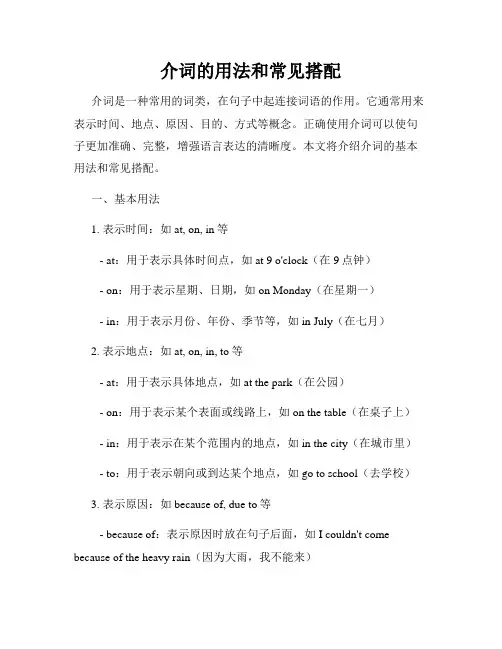
介词的用法和常见搭配介词是一种常用的词类,在句子中起连接词语的作用。
它通常用来表示时间、地点、原因、目的、方式等概念。
正确使用介词可以使句子更加准确、完整,增强语言表达的清晰度。
本文将介绍介词的基本用法和常见搭配。
一、基本用法1. 表示时间:如at, on, in等- at:用于表示具体时间点,如at 9 o'clock(在9点钟)- on:用于表示星期、日期,如on Monday(在星期一)- in:用于表示月份、年份、季节等,如in July(在七月)2. 表示地点:如at, on, in, to等- at:用于表示具体地点,如at the park(在公园)- on:用于表示某个表面或线路上,如on the table(在桌子上) - in:用于表示在某个范围内的地点,如in the city(在城市里) - to:用于表示朝向或到达某个地点,如go to school(去学校)3. 表示原因:如because of, due to等- because of:表示原因时放在句子后面,如I couldn't come because of the heavy rain(因为大雨,我不能来)- due to:表示原因时放在句子前面,如Due to the bad weather, the flight was delayed(由于天气不好,航班延误了)4. 表示目的:如for, to等- for:表示为了某个目的,如I bought a gift for my friend(我给朋友买了一份礼物)- to:表示某个动作的目的,如I went to the supermarket to buy some groceries(我去超市买了些杂货)5. 表示方式:如by, with等- by:表示某个动作的方式或手段,如travel by train(乘火车旅行) - with:表示某个工具或伴随的状态,如cut the cake with a knife(用刀子切蛋糕)二、常见搭配1. at:at home(在家)、at work(在工作)、at school(在学校)、at the airport(在机场)2. on:on the bus(在公交车上)、on the phone(打电话)、on the way(在路上)、on the Internet(在互联网上)3. in:in the morning(在早上)、in the evening(在晚上)、in the park(在公园)、in a hurry(匆忙地)4. to:go to bed(上床睡觉)、come to a decision(作出决定)、send a message to(发送消息给)5. for:for example(例如)、for sure(肯定)、for the first time(第一次)、for a long time(很久)6. by:by car(乘车)、by oneself(独自)、by accident(偶然地)、by hand(手工)7. with:play with friends(和朋友一起玩)、talk with teachers(和老师交谈)、help with homework(帮助做作业)三、总结介词是连接词语、起连接作用的重要词类。
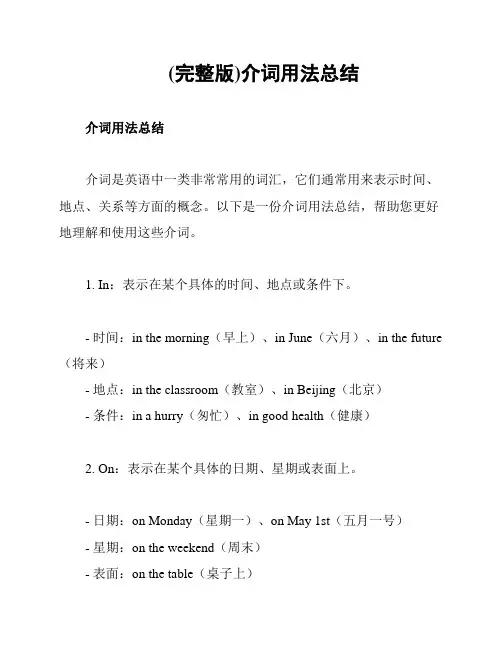
(完整版)介词用法总结介词用法总结介词是英语中一类非常常用的词汇,它们通常用来表示时间、地点、关系等方面的概念。
以下是一份介词用法总结,帮助您更好地理解和使用这些介词。
1. In:表示在某个具体的时间、地点或条件下。
- 时间:in the morning(早上)、in June(六月)、in the future (将来)- 地点:in the classroom(教室)、in Beijing(北京)- 条件:in a hurry(匆忙)、in good health(健康)2. On:表示在某个具体的日期、星期或表面上。
- 日期:on Monday(星期一)、on May 1st(五月一号)- 星期:on the weekend(周末)- 表面:on the table(桌子上)3. At:表示在某个具体的时间、地点或时刻。
- 时间:at 3 o'clock(三点钟)、at night(晚上)- 地点:at the park(公园)- 时刻:at the moment(此刻)4. By:表示通过某种方式或由某人完成某事。
- 方式:go to work by car(坐车上班)- 人:the book written by Mark Twain(马克·吐温所写的书)5. With:表示陪同、具备、使用等概念。
- 陪同:go shopping with friends(和朋友一起去购物)- 具备:a house with a garden(带有花园的房子)- 使用:write with a pen(用钢笔写)6. For:表示为了某个目的、期间或持续时间。
- 目的:study for the test(为考试研究)- 期间:wait for a while(等一会儿)- 持续时间:sleep for eight hours(睡八个小时)以上是介词的基本用法总结,希望对您有所帮助!。
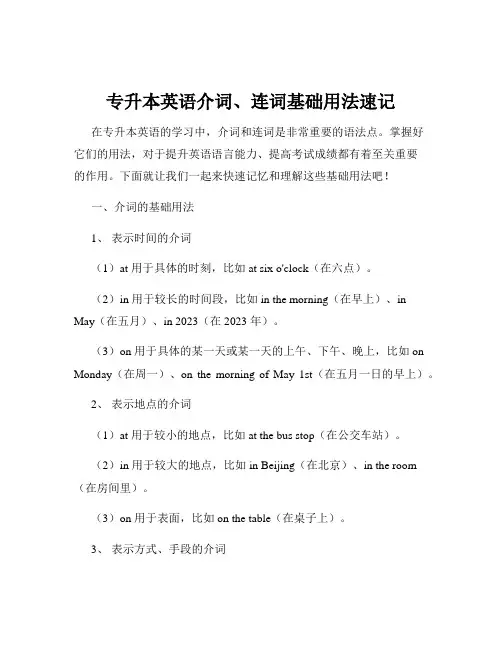
专升本英语介词、连词基础用法速记在专升本英语的学习中,介词和连词是非常重要的语法点。
掌握好它们的用法,对于提升英语语言能力、提高考试成绩都有着至关重要的作用。
下面就让我们一起来快速记忆和理解这些基础用法吧!一、介词的基础用法1、表示时间的介词(1)at 用于具体的时刻,比如 at six o'clock(在六点)。
(2)in 用于较长的时间段,比如 in the morning(在早上)、inMay(在五月)、in 2023(在 2023 年)。
(3)on 用于具体的某一天或某一天的上午、下午、晚上,比如 on Monday(在周一)、on the morning of May 1st(在五月一日的早上)。
2、表示地点的介词(1)at 用于较小的地点,比如 at the bus stop(在公交车站)。
(2)in 用于较大的地点,比如 in Beijing(在北京)、in the room (在房间里)。
(3)on 用于表面,比如 on the table(在桌子上)。
3、表示方式、手段的介词(1)by 表示通过某种方式,比如 by bus(乘公交车)、by hand(用手)。
(2)with 表示用某种工具,比如 with a pen(用一支笔)。
(3)in 表示用某种语言或材料,比如 in English(用英语)、in ink (用墨水)。
4、其他常见的介词用法(1)about 表示关于,比如 talk about(谈论关于)。
(2)for 表示为了、给,比如 buy a gift for her(给她买一份礼物)。
(3)of 表示的,比如 a map of China(一张中国地图)。
(4)from 表示从,比如 come from China(来自中国)。
(5)to 表示到,比如 go to school(去上学)。
二、连词的基础用法1、并列连词(1)and 表示并列、顺承关系,比如 He is tall and handsome(他又高又帅。
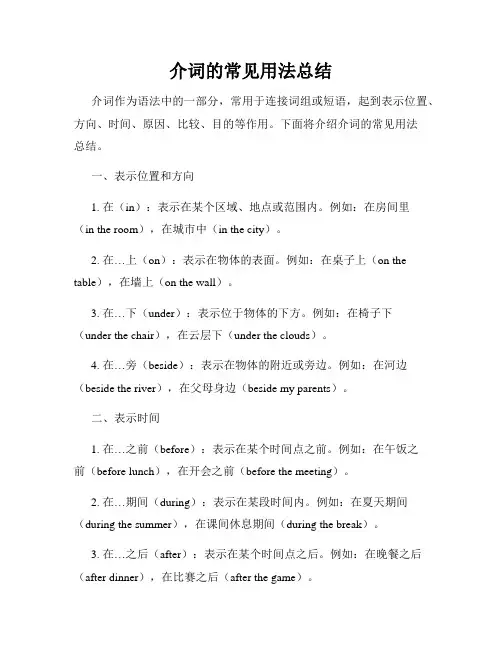
介词的常见用法总结介词作为语法中的一部分,常用于连接词组或短语,起到表示位置、方向、时间、原因、比较、目的等作用。
下面将介绍介词的常见用法总结。
一、表示位置和方向1. 在(in):表示在某个区域、地点或范围内。
例如:在房间里(in the room),在城市中(in the city)。
2. 在…上(on):表示在物体的表面。
例如:在桌子上(on the table),在墙上(on the wall)。
3. 在…下(under):表示位于物体的下方。
例如:在椅子下(under the chair),在云层下(under the clouds)。
4. 在…旁(beside):表示在物体的附近或旁边。
例如:在河边(beside the river),在父母身边(beside my parents)。
二、表示时间1. 在…之前(before):表示在某个时间点之前。
例如:在午饭之前(before lunch),在开会之前(before the meeting)。
2. 在…期间(during):表示在某段时间内。
例如:在夏天期间(during the summer),在课间休息期间(during the break)。
3. 在…之后(after):表示在某个时间点之后。
例如:在晚餐之后(after dinner),在比赛之后(after the game)。
三、表示原因1. 因为(because of):表示由于某个原因。
例如:因为天气原因(because of the weather),因为健康问题(because of health issues)。
2. 由于(due to):表示由于某种情况或原因。
例如:由于交通堵塞(due to traffic congestion),由于工作原因(due to work commitments)。
四、表示比较1. 像…一样(like):表示两个或多个事物在某些方面的相似性。
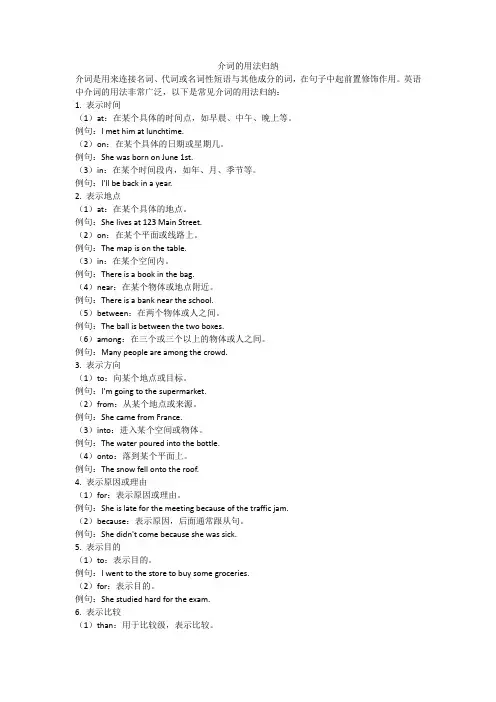
介词的用法归纳介词是用来连接名词、代词或名词性短语与其他成分的词,在句子中起前置修饰作用。
英语中介词的用法非常广泛,以下是常见介词的用法归纳:1. 表示时间(1)at:在某个具体的时间点,如早晨、中午、晚上等。
例句:I met him at lunchtime.(2)on:在某个具体的日期或星期几。
例句:She was born on June 1st.(3)in:在某个时间段内,如年、月、季节等。
例句:I'll be back in a year.2. 表示地点(1)at:在某个具体的地点。
例句:She lives at 123 Main Street.(2)on:在某个平面或线路上。
例句:The map is on the table.(3)in:在某个空间内。
例句:There is a book in the bag.(4)near:在某个物体或地点附近。
例句:There is a bank near the school.(5)between:在两个物体或人之间。
例句:The ball is between the two boxes.(6)among:在三个或三个以上的物体或人之间。
例句:Many people are among the crowd.3. 表示方向(1)to:向某个地点或目标。
例句:I'm going to the supermarket.(2)from:从某个地点或来源。
例句:She came from France.(3)into:进入某个空间或物体。
例句:The water poured into the bottle.(4)onto:落到某个平面上。
例句:The snow fell onto the roof.4. 表示原因或理由(1)for:表示原因或理由。
例句:She is late for the meeting because of the traffic jam.(2)because:表示原因,后面通常跟从句。
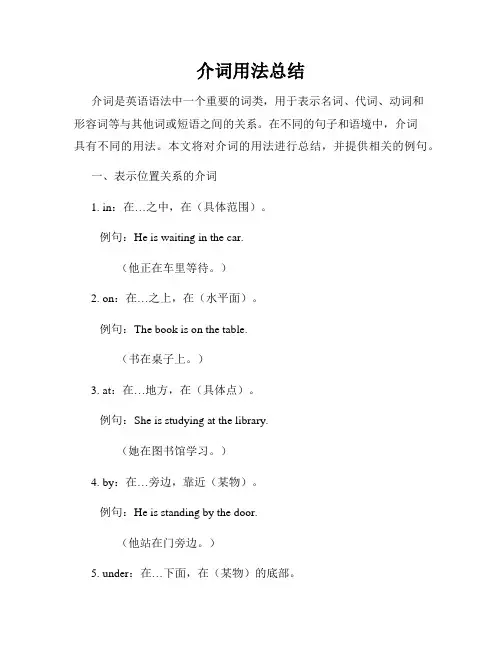
介词用法总结介词是英语语法中一个重要的词类,用于表示名词、代词、动词和形容词等与其他词或短语之间的关系。
在不同的句子和语境中,介词具有不同的用法。
本文将对介词的用法进行总结,并提供相关的例句。
一、表示位置关系的介词1. in:在…之中,在(具体范围)。
例句:He is waiting in the car.(他正在车里等待。
)2. on:在…之上,在(水平面)。
例句:The book is on the table.(书在桌子上。
)3. at:在…地方,在(具体点)。
例句:She is studying at the library.(她在图书馆学习。
)4. by:在…旁边,靠近(某物)。
例句:He is standing by the door.(他站在门旁边。
)5. under:在…下面,在(某物)的底部。
例句:The cat is hiding under the bed.(猫在床下躲藏。
)6. between:在…之间(两者之间)。
例句:The restaurant is located between the bank and the supermarket.(这家餐厅位于银行和超市之间。
)二、表示时间关系的介词1. at:在(具体时间点)。
例句:She will meet her friend at 8 o'clock.(她将在8点钟见她的朋友。
)2. on:在(具体日期或星期)。
例句:I have a meeting on Monday.(星期一我有个会议。
)3. in:在(一段时间内)。
例句:He will travel to Europe in summer.(他将在夏天去欧洲旅行。
)4. during:在…期间,表示全程。
例句:I read a book during the flight.(我在飞行途中读了一本书。
)5. for:持续时间,表示时间段。
例句:They have been married for ten years.(他们已经结婚十年了。
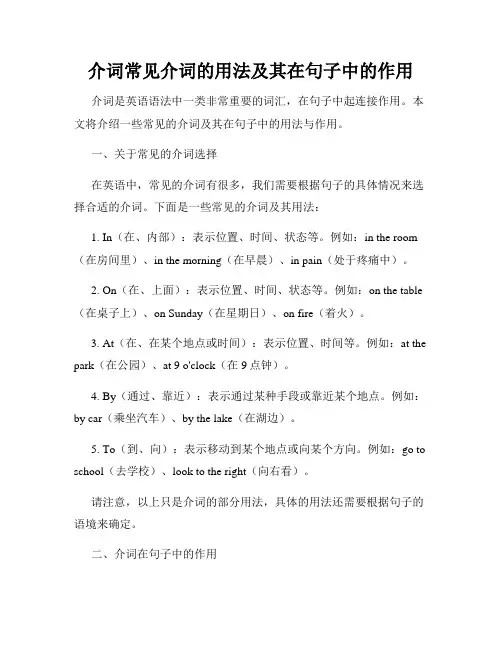
介词常见介词的用法及其在句子中的作用介词是英语语法中一类非常重要的词汇,在句子中起连接作用。
本文将介绍一些常见的介词及其在句子中的用法与作用。
一、关于常见的介词选择在英语中,常见的介词有很多,我们需要根据句子的具体情况来选择合适的介词。
下面是一些常见的介词及其用法:1. In(在、内部):表示位置、时间、状态等。
例如:in the room (在房间里)、in the morning(在早晨)、in pain(处于疼痛中)。
2. On(在、上面):表示位置、时间、状态等。
例如:on the table (在桌子上)、on Sunday(在星期日)、on fire(着火)。
3. At(在、在某个地点或时间):表示位置、时间等。
例如:at the park(在公园)、at 9 o'clock(在9点钟)。
4. By(通过、靠近):表示通过某种手段或靠近某个地点。
例如:by car(乘坐汽车)、by the lake(在湖边)。
5. To(到、向):表示移动到某个地点或向某个方向。
例如:go to school(去学校)、look to the right(向右看)。
请注意,以上只是介词的部分用法,具体的用法还需要根据句子的语境来确定。
二、介词在句子中的作用介词在句子中起到连接的作用,连接名词、动词、形容词等与其他成分之间的关系。
下面将介绍介词在句子中常见的几种用法:1. 表示位置关系:例如,在句子“The book is on the table.”中,介词on表示书放在桌子上。
2. 表示时间关系:例如,在句子“I have a meeting at 9 o'clock.”中,介词at表示在9点钟有一个会议。
3. 表示方式或手段:例如,在句子“He solved the problem by himself.”中,介词by表示他自己通过/用自己的方式解决了问题。
4. 表示目的或用途:例如,在句子“She bought some flowers for her mother.”中,介词for表示她为她的母亲买了些花。
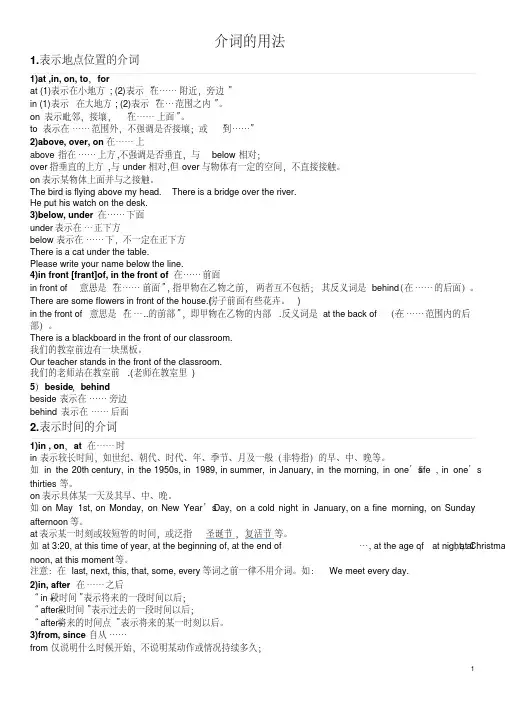
介词的用法1.表示地点位置的介词1)at ,in, on, to,forat (1)表示在小地方; (2)表示“在……附近,旁边”in (1)表示在大地方; (2)表示“在…范围之内”。
on 表示毗邻,接壤,“在……上面”。
to 表示在……范围外,不强调是否接壤;或“到……”2)above, over, on 在……上above 指在……上方,不强调是否垂直,与below相对;over指垂直的上方,与under相对,但over与物体有一定的空间,不直接接触。
on表示某物体上面并与之接触。
The bird is flying above my head. There is a bridge over the river.He put his watch on the desk.3)below, under 在……下面under表示在…正下方below表示在……下,不一定在正下方There is a cat under the table.Please write your name below the line.4)in front [frant]of, in the front of在……前面意思是“在……前面”,指甲物在乙物之前,两者互不包括;其反义词是behind(在……的后面)。
in front of…There are some flowers in front of the house.(房子前面有些花卉。
)in the front of 意思是“在…..的前部”,即甲物在乙物的内部.反义词是at the back of…(在……范围内的后部)。
There is a blackboard in the front of our classroom.我们的教室前边有一块黑板。
Our teacher stands in the front of the classroom.我们的老师站在教室前.(老师在教室里)5)beside,behindbeside 表示在……旁边behind 表示在……后面2.表示时间的介词1)in , on,at 在……时in表示较长时间,如世纪、朝代、时代、年、季节、月及一般(非特指)的早、中、晚等。
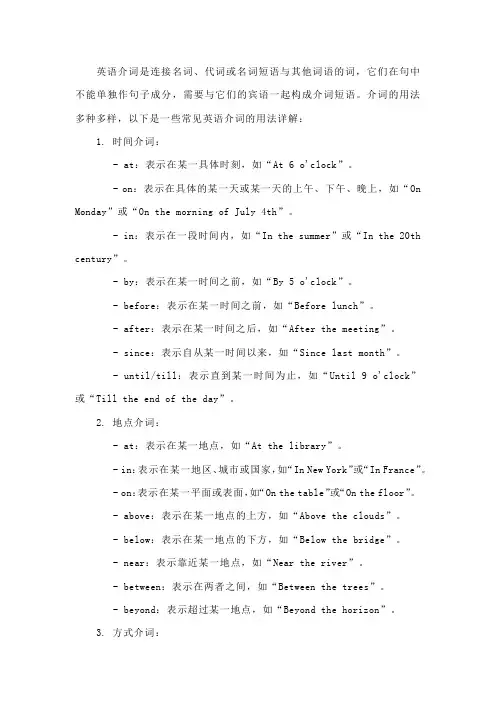
英语介词是连接名词、代词或名词短语与其他词语的词,它们在句中不能单独作句子成分,需要与它们的宾语一起构成介词短语。
介词的用法多种多样,以下是一些常见英语介词的用法详解:1. 时间介词:- at:表示在某一具体时刻,如“At 6 o'clock”。
- on:表示在具体的某一天或某一天的上午、下午、晚上,如“On Monday”或“On the morning of July 4th”。
- in:表示在一段时间内,如“In the summer”或“In the 20th century”。
- by:表示在某一时间之前,如“By 5 o'clock”。
- before:表示在某一时间之前,如“Before lunch”。
- after:表示在某一时间之后,如“After the meeting”。
- since:表示自从某一时间以来,如“Since last month”。
- until/till:表示直到某一时间为止,如“Until 9 o'clock”或“Till the end of the day”。
2. 地点介词:- at:表示在某一地点,如“At the library”。
- in:表示在某一地区、城市或国家,如“In New York”或“In France”。
- on:表示在某一平面或表面,如“On the table”或“On the floor”。
- above:表示在某一地点的上方,如“Above the clouds”。
- below:表示在某一地点的下方,如“Below the bridge”。
- near:表示靠近某一地点,如“Near the river”。
- between:表示在两者之间,如“Between the trees”。
- beyond:表示超过某一地点,如“Beyond the horizon”。
3. 方式介词:- by:表示通过某种方式或手段,如“By car”或“By phone”。
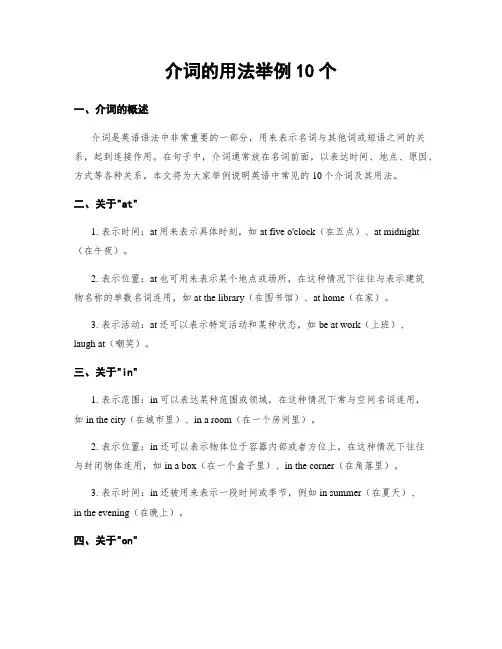
介词的用法举例10个一、介词的概述介词是英语语法中非常重要的一部分,用来表示名词与其他词或短语之间的关系,起到连接作用。
在句子中,介词通常放在名词前面,以表达时间、地点、原因、方式等各种关系。
本文将为大家举例说明英语中常见的10个介词及其用法。
二、关于"at"1. 表示时间:at用来表示具体时刻,如at five o'clock(在五点)、at midnight (在午夜)。
2. 表示位置:at也可用来表示某个地点或场所,在这种情况下往往与表示建筑物名称的单数名词连用,如at the library(在图书馆)、at home(在家)。
3. 表示活动:at还可以表示特定活动和某种状态,如be at work(上班)、laugh at(嘲笑)。
三、关于"in"1. 表示范围:in可以表达某种范围或领域,在这种情况下常与空间名词连用,如in the city(在城市里)、in a room(在一个房间里)。
2. 表示位置:in还可以表示物体位于容器内部或者方位上,在这种情况下往往与封闭物体连用,如in a box(在一个盒子里)、in the corner(在角落里)。
3. 表示时间:in还被用来表示一段时间或季节,例如in summer(在夏天)、in the evening(在晚上)。
四、关于"on"1. 表示日期或某一天:on常用来表示特定的日期或某一天,在这种情况下通常与星期连用,如on Monday(在星期一)、on Christmas Day(在圣诞节)。
2. 表示表面:on也可以用来表示物体的表面,如on the table(在桌子上)、write on paper(写在纸上)。
3. 表示交通工具:on还可以表示乘坐交通工具或使用某种媒介,如get on abus(上公交车)、listen to music on the radio(听收音机播放的音乐)。
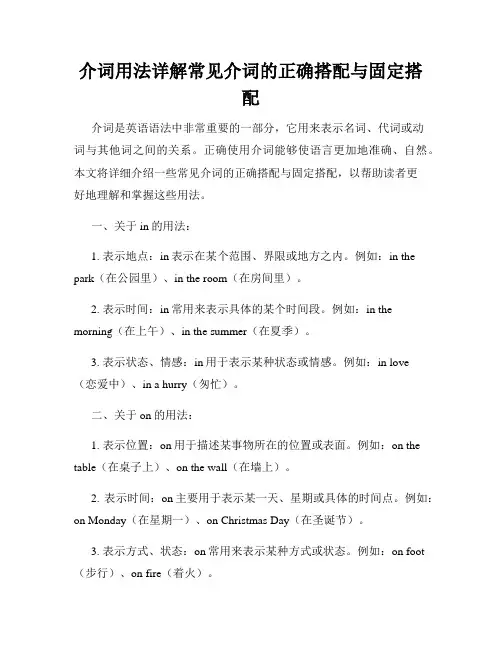
介词用法详解常见介词的正确搭配与固定搭配介词是英语语法中非常重要的一部分,它用来表示名词、代词或动词与其他词之间的关系。
正确使用介词能够使语言更加地准确、自然。
本文将详细介绍一些常见介词的正确搭配与固定搭配,以帮助读者更好地理解和掌握这些用法。
一、关于in的用法:1. 表示地点:in表示在某个范围、界限或地方之内。
例如:in the park(在公园里)、in the room(在房间里)。
2. 表示时间:in常用来表示具体的某个时间段。
例如:in the morning(在上午)、in the summer(在夏季)。
3. 表示状态、情感:in用于表示某种状态或情感。
例如:in love(恋爱中)、in a hurry(匆忙)。
二、关于on的用法:1. 表示位置:on用于描述某事物所在的位置或表面。
例如:on the table(在桌子上)、on the wall(在墙上)。
2. 表示时间:on主要用于表示某一天、星期或具体的时间点。
例如:on Monday(在星期一)、on Christmas Day(在圣诞节)。
3. 表示方式、状态:on常用来表示某种方式或状态。
例如:on foot (步行)、on fire(着火)。
三、关于at的用法:1. 表示地点:at用于表示具体的某个地点或位置。
例如:at the airport(在机场)、at the bus stop(在公交车站)。
2. 表示时间:at用于表示具体的某一时刻。
例如:at 8 o'clock(在8点钟)、at midnight(在午夜)。
3. 表示某种状态、情感:at常用来表示某种状态或情感。
例如:at peace(和平)、at a loss(困惑)。
四、关于to的用法:1. 表示方向、目的地:to用于表示某个方向或目的地。
例如:go to school(去学校)、fly to Beijing(飞往北京)。
2. 表示时间:to用于表示某个时间点或一段时间之后。
史上超全的英语介词用法归纳总结!不看太可惜了下面是一个关于英文介词用法的全面总结:一、表示位置或方向的介词1. in:表示在三维空间的内部,或在较大的地区、地点中。
例如:in the room(在房间里)、in New York(在纽约)2. on:表示在二维平面上,或接触到表面。
例如:on the table(在桌子上)、on the wall(在墙壁上)3. at:表示在一个点或位置上,或在一些地方。
例如:at the bus stop(在公交车站)、at the park(在公园)4. under:表示在物下方或接触到底部。
例如:under the bed(在床下)、under the table(在桌子下)5. over:表示在物的上方。
例如:over the sky(在天空上方)、over the bridge(在桥上方)6. above:表示在物的上方,但没有直接的接触。
例如:above the clouds(在云层上方)、above the ground(在地面上方)7. below:表示在物下方,但没有直接的接触。
例如:below the surface(在水面下方)、below the picture(在图画下方)8. beside:表示在物的旁边。
例如:beside the lake(在湖边)、beside the tree(在树旁)9. between:表示在两个物体或位置之间。
例如:between the two buildings(在两座建筑物之间)、between the chair and the table(在椅子和桌子之间)10. among:表示在三个或更多的物体之间。
例如:among the flowers(在花朵之间)、among the students (在学生之间)二、表示时间的介词1. at:表示一个点的特定时间。
例如:at 9 o'clock(在9点)2. on:表示在其中一天或日期。
常用英语介词在英语中,介词是一类用来表示词与词之间关系的词汇,它们通常位于名词或代词之前,用来说明这个名词或代词与句子中其他部分的关系。
介词的使用非常广泛,它们可以表达时间、地点、方向、原因、目的等多种含义。
以下是一些常用的英语介词及其用法:1. 在...之前 - before在某个时间点或事件之前,我们使用介词“before”。
例如:I need to finish my homework before dinner.2. 在...之后 - after“after”用于表示某个时间点或事件之后。
例如:We will go to the movies after we finish our homework.3. 在...之上 - on“on”用来表示某物在另一物的表面之上。
例如:The book is on the table.4. 在...之下 - under“under”表示某物在另一物的下方。
例如:The cat is under the bed.5. 在...旁边 - beside“beside”用于描述两个物体并排放置。
例如:She sat beside him on the bench.6. 在...之间 - between“between”用来表示两个物体或人之间的空间。
例如:The houseis situated between the two mountains.7. 在...之内 - within“within”表示在某物的内部或某个时间范围内。
例如:The package should arrive within two days.8. 在...之外 - outside“outside”用于描述某物在另一物的外部。
例如:He was standing outside the building.9. 通过... - through“through”表示穿过某个空间或物体。
介词的用法和作用一、介词的定义介词是英语中一种词类,常用于连接名词、代词或者名词性的结构,来说明一个事物与另一个事物之间的关系。
介词通常出现在主语和谓语之间,帮助确定谓语动作发生的地点、时间、原因等方面的信息。
本文将详细介绍介词的用法和作用。
二、表示地点的介词1. 在(in)在英语中,“in”表示某人或某物处于一个相对封闭空间内部。
它可以用来指代建筑物、房间、城市等具体范围。
例如:“He is in the office.”(他在办公室里)2. 在……上(on)“on”表示某物或某人所处于特定平面或表面之上,可以指代台面、桌子,甚至是网页等。
例如:“There's a book on the table.”(桌子上有本书)3. 在……下(under)“under”表示某人或某物所处于其他对象的底下。
例如:“The cat is under the table.”(猫在桌子底下)三、表示时间的介词1. 在……时刻(at)“at”通常用来指定具体时间点。
它可以与小时、几天之后等概念连用,如“At 9 o'clock”(在九点钟),“At Christmas”(在圣诞节)。
例如:“I will meet you at the park at 2 p.m.”(我将于下午两点在公园见你)2. 在……期间(during)“during”用于表示某个事件的整个过程或持续时间。
例如:“During the summer vacation, I went to the beach every day.”(暑假期间,我每天去海滩)四、表示原因和目的的介词1. 因为(because of)“because of”常用来表达某件事情发生的原因。
它通常引导一个从句,说明造成某个情况或结果的原因。
例如:“I couldn't go to the party because of the heavy rain.”(因为大雨,我不能去参加派对)2. 为了(for)“for”通常用来表示目的,表明某人或某物是为了实现某种目标而进行行动。
英语介词用法最全总结英语介词是学习英语语法中非常重要的一部分,它们在句子中起着连接词的作用,指示名词、代词或动词与其他词之间的关系。
正确地使用介词可以使句子更加生动、准确,并且对于掌握英语的表达能力至关重要。
下面将为大家总结英语中常见的介词用法。
1. 位置(Location)介词在描述位置时非常常用。
例如,在描述位置关系时可以使用"in"、"on"、"under"、"beside"、"in front of" 等。
比如:The book is on the table(书在桌子上)。
2. 时间(Time)表达时间关系时,介词也是必不可少的。
例如,在描述时间时可以使用 "at"、"in"、"on"、"during"、"for" 等。
比如:I will meet you at 7 o'clock(我会在7点见你)。
3. 方式(Manner)介词在描述方式时的使用较为灵活。
比如:She walked with confidence(她自信地走着)。
4. 原因(Cause)介词可以用于表达原因。
比如:They canceled the trip due to bad weather(由于天气恶劣,他们取消了旅行)。
5. 目的(Purpose)介词也能表达目的。
比如:He went to the store to buy some groceries (他去商店买些食品)。
6. 所属关系(Possession)介词可以用于表达所属关系。
比如:This book belongs to me(这本书是我的)。
7. 比较(Comparison)在进行比较时,介词也可以派上用场。
比如:I am taller than my sister(我比我妹妹高)。
英语介词的用法归纳介词是英语中一类重要的词性,在句子中起着连接词组和表达位置、方向、时间等关系的作用。
掌握英语介词的用法对于理解和运用英语语法至关重要。
在本文中,我们将对常见的英语介词进行归纳总结,并给出一些例句来帮助读者更好地理解和运用这些介词。
一、表示位置的介词1. in:表示在某个范围、地点或场所内。
例如:- She lives in London.(她住在伦敦。
)- Put the books in the box.(把书放到盒子里。
)2. on:表示在某个平面(桌面、地面)上。
例如:- The cat is sitting on the roof.(猫坐在屋顶上。
)- I put my keys on the table.(我把钥匙放在桌子上。
)3. at:表示在某个具体地方或位置。
例如:- We will meet at the park.(我们会在公园见面。
)- He is waiting for you at the bus stop.(他正在公交车站等你。
)二、表示方向的介词1. to:表示动作的方向。
例如:- I went to the supermarket.(我去了超市。
)- She walked to the park.(她走到了公园。
)2. into:表示进入某个地方或物体内部。
例如:- The cat jumped into the box.(猫跳进了盒子里。
)- He put the book into his bag.(他把书放进了书包里。
)3. out of:表示离开某个地方或物体外部。
例如:- She ran out of the room.(她从房间里跑了出来。
)- Take the dishes out of the dishwasher.(把盘子从洗碗机里取出来。
)三、表示时间的介词1. at:表示具体的时间点。
例如:- The party starts at 7 p.m.(晚会从晚上7点开始。
介词的正确用法介词是连接词与词、短语与短语、句子与句子之间关系的词类。
在英语中,介词的正确使用对于准确表达意思至关重要。
本文将介绍介词的基本用法,并提供一些例子帮助读者更好地理解如何正确使用介词。
1. 表示位置关系介词在表示位置关系时非常常见。
以下是一些常用的表达方式:- in:表示在某个大的范围之内,如 in the park(在公园里),in the city(在城市里)。
- on:表示在某个表面上,如 on the table(在桌子上),on the wall (在墙上)。
- at:表示在某个具体的地方,如 at home(在家里),at the office (在办公室)。
2. 表示时间关系介词在表示时间关系时也很常见。
以下是一些常用的表达方式:- at:表示在具体的时间点上,如 at 7 o'clock(在7点钟),at noon (在中午)。
- on:表示在某个具体的日期或日子上,如on Monday(星期一),on New Year's Day(元旦)。
- in:表示在一个时间段内,如 in the morning(早上),in December(在12月)。
3. 表示原因和目的介词也可以用来表示原因和目的。
以下是一些常见的表达方式:- for:表示做某事的目的,如 for studying(为了学习)。
- because of:表示某个原因,如 because of the rain(因为下雨)。
4. 表示方式和手段介词还可以用来表示方式和手段。
以下是一些常用的表达方式:- by:表示通过某种方式或手段,如 by car(乘坐汽车),by email (通过电子邮件)。
5. 表示所有关系介词还可以用来表示所有关系。
以下是一些常见的表达方式:- of:表示所属关系,如 the book of John(约翰的书)。
- 's:表示所属关系,如 John's book(约翰的书)。
介词一、介词的定义介词是一类虚词,不能独立作句子成分,必须与名词或代词等词类一起构成介词短语,才可以充当句子成分。
介词在句子中一般不重读。
二、介词的种类l.简单介词例如:at,in,on,under,of,after,over,past等。
2.复合介词例如:into,onto,throughout,without,within,nearby等。
3.短语介词例如:in front of,because of,instead of,according to,out of等。
三、介词短语的用法1.在句子中作表语Between my school and the zoo is a stone bridge.在我的学校与动物园之间是一座石桥。
Mary and John are from Australia.玛丽和约翰来自澳大利亚。
Our school is in front of the factory.我们的学校就在那个工厂的前面。
2.在句子中充当后置定语The young man under the tree is my friend Li Ming.那个在树下的年轻人是我的朋友李明。
China is a country with a long history.中国是具有悠久历史的国家。
This is not the key to the door.这不是那扇门的钥匙。
3.在句子中作状语My mother looks younger for her age.我妈妈显得比实际年龄更年轻。
Our library keeps open from eight o'clock in the morning to nine o'clock in the evening.我们图书馆从上午8:00到晚上9:00都开门。
4.在句子中作宾语补足语We all think Li Mei as a good girl.我们都把李梅看作是一个好姑娘。
She found herself in a strange room when she woke up.她醒来时发现自己在一个陌生的房间里。
5. 在句子中作介词的宾语The policeman took the picture from under the book.警察从那本书的下面把照片取了出来。
It's said that the secret is from inside the well.据说秘密来自这口井的里面。
四、表示时间的介词。
l. at, on, in(1)at用于表示某一具体时刻或时间点。
例如:at night 在夜晚at noon 在中午at midnight 在午夜at ten o' clock在十点钟at Christmas在圣诞节at present在目前(2)on指“具体的某一天或某天的上午、下午、晚上”,在重大节日前也可用on。
例如:on a cold day 在一个寒冷的日子on Sunday 在星期天on the morning of Oct.1st在十月一日的早晨on September l0th 在九月十号on Christmas Eve在圣诞前夜on Monday evening 在星期一晚上年、月、日表示法:无“日”添上“in”,有“日”就用“on”。
(3)in表示周、月、季节、年或泛指上午、下午、晚上。
例如:in a week 在一周内in February 在二月in spring 在春季in the day 在白天in 2004 在2004年泛指上午、下午、晚上时,用in, 特指某一日的上午、下午、晚上时,用on.in the evening 在晚上on Sunday evening 在周日晚上注意英语中时间状语不用介词的情况很多,现归纳如下:①在this, that, these等组成的词组前不用介词。
如:We are in Grade Two this year.今年我们上二年级。
Bob's wife told him that he had forgotten his wallet that morning.鲍勃的妻子告诉他,他那天早晨忘带钱包了。
Tom's trouble is very common to boys these days.汤姆的问题这些天在男孩们中间很常见。
②由next或last构成的词组前不用介词。
如:When did you go to bed last night?你昨晚几点上床睡觉的?The next day she got up early and went to school without breakfast.第二天她起得很早,没吃早饭就去了学校。
③当yesterday,tomorrow用作副词或由它们构成的短语前不用介词。
如:Can you be here at eight tomorrow morning?你明早八点能在这里吗?Were you at home yesterday evening?你昨晚在家吗?④在含有a,one,every,some,all等词的短语前不用介词。
如:One day the woman learned that Liszt himself Was in town.一天妇人听说李斯特本人就在镇上。
I hope to go to the moon some day.我希望有一天去月球。
2. before, after(1)before表示“在某时刻或某件事之前”。
例如:He must be at home before 5:00 pm.下午五点之前他一定在家。
Check your papers carefully before handing them in. 在交卷之前,仔细检查你的试卷。
(2)after表示“在某时刻或某件事之后”。
例如:After breakfast she hurried to school。
早饭后,她匆忙上学去了。
Call me at once after you get there.到那儿之后马上给我打电话。
She came here after me.她在我之后来这儿。
3.by, until (till)(1)by表示“在,,之前;到,,为止”。
例如:You must finish your job by six o'clock.你必须在六点之前完成这项工作。
By the time he got here,the meeting had been over.他到这儿时,会议已结束了。
We had learned 5,000 words by the end of last year.到去年年底为止,我们已学了五千多单词。
(2)until(till)”表示“直到,,才,,.”。
例如:She didn't go home until lunch time.直到午饭时间她才回家。
We waited until 10 o'clock last night.昨晚我们一直等到十点钟。
注意:until 与瞬间动词(点动词)连用时,必须用否定式;而与延续性动词连用时,用肯定式。
My father didn’t buy me a bike until last week.我父亲直到上星期才给我买了一辆自行车。
(buy 是瞬间动词,所以用否定)You can keep this book till next month.这本书你可以借到下个月。
(keep是延续性动词,用肯定式)4.from, since(1) from表示“从,,时起”。
一般都是用词组from,,to,,from用于现在时,过去时和将来时。
例如:from ten o'clock to twelve o'clock从十点到十二点from this year 从今年开始from Sunday 从星期天开始from day to night 从白天到黑夜The meeting will be held from eight to ten.这个会议将从8点开到10点。
(2)since表示“自过去某一时刻或行为以来”。
经常用于含有完成时的句子里,后面跟过去某一时间点;since还可以用作副词和连词。
例如:They came to Beijing in 1950 and have lived here since then.一九五O年他们来到北京,以后就一直住在这儿。
He's worked on the farm since he left the army.(自从)他离开部队以来,一直在农场工作。
5.for,during, through(1)for引导一段时间,强调时间由始至终,可译为“(时间)长达,,”,一般与有长度的时间短语连用,如for three weeks, for a long time 等,可用于现在(过去)完成时或过去时的句子里。
例如:He studied English for three years.他学了三年英语。
The French teacher has been in China for about a month.这位法国老师在中国已经大约一个月了。
(2)during意为“在,,期间”,与一段时间的整体连用。
如:during the spring, during last year, during l980等,也可以和表示延续性事件的名词连用,如during my childhood.during our stay, during his visit等,一般不用于现在完成时的句子里。
例如:During the winter we play football.冬季我们踢足球。
Many comrades went to see him during his illness.在他生病期间许多同志去看望了他。
(3)through表示“从,,开始到,,结束(全过程)”例如:It is very hot through the whole summer this year.今年整个夏季都很热。
6.in, within(1)in表示“过,,之后”,多用于将来时(一般将来时和过去将来时)例如:in ten minutes 十分钟之后in two weeks 两周之后The delegation will arrive in three days.代表团将于三天后到达。
They said they would return home in a week.他们说他们一周后回家。